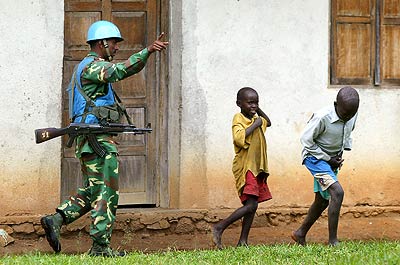|
|
||||||
 |
 |
| About sponsorship |
| |
 | |
EIGHTEEN months after Rwanda and the Democratic Republic of Congo agreed to stop fighting, the two countries are again on the verge of war. Rwanda's president, Paul Kagame, has officially given notice that his troops will march into eastern Congo, and some reports suggest they already have.
The last time the Rwandans invaded, in 1998, they sparked a complex five-year war that left perhaps 3m dead, mostly from war-induced starvation and disease. A new conflict probably would not be as bad, but it is hardly surprising that the people of eastern Congo are terrified.
Congo's government is demanding UN sanctions against Mr Kagame and his entourage, and has vowed to send a large force to repel the invaders. Its army is hopelessly ill-disciplined, however, and no match for the Rwandans in a part of Congo that is much closer to Rwanda's capital than to Congo's.
For the past decade, Rwanda's justification for meddling in Congo has been the need to crush genocidal Rwandan rebels hiding in the Congolese rain forest. Though the lure of loot has also been a factor—Congo is fabulously mineral-rich—this claim has merit. The UN peacekeeping force in Congo (MONUC), the world's largest, is supposed to be disarming these rebels, but has failed to neutralise them.
Indeed, since MONUC was first deployed to Congo in 1999, it has consistently failed to keep anyone in the region safe. In two Congolese cities in 2002 and 2003, UN soldiers watched as hundreds of civilians were murdered outside their bases.
In May this year, they sat back as an unsavoury rebel chief seized control of Bukavu, Congo's fourth city, despite the presence of a large and well-armed MONUC garrison on the outskirts of town. The blue helmets could easily have scattered the rebels, but the only shots they fired in anger that week were at civilians demonstrating against their inaction. Three of the protesters died.
That same month in Bukavu, your correspondent joined South African peacekeepers on a night patrol to rescue some nuns besieged in a convent by renegade troops. New in town, the South Africans got lost. After wandering around for an hour looking for a convent with a red gate, the captain in charge ordered his armoured personnel carrier to a halt outside a deserted house with a black gate. “Yes, I think we've found it,” he radioed back to base. “Everything seems quiet here, we're coming home.”
MONUC's chiefs have argued that they do not have enough troops for the job. They have a point. Though the UN Security Council has ordered the force to be expanded from about 10,000 to 16,000, military experts guess it needs about 50,000. It won't get that. Why, then, is the UN in Congo at all? MONUC argues that, though small, the mission serves as a deterrent. But whom does it deter?
The ragtag militias that effectively control the north-eastern region of Ituri delight in taking potshots at peacekeeping units. Deterrence, argues Jim Terrie of the International Crisis Group, a lobbying organisation, depends in part on potential enemies' belief “that you will actually do something. [But] there is very little belief that MONUC will do anything.”
MONUC has already indicated that it probably will not stop a Rwandan invasion. This may be because Rwanda has signalled that it will make only a brief foray into Congo to kill the rebels who threaten it, and then leave. But if so, that would hardly satisfy the people of eastern Congo.
Indeed, it would be hard to exaggerate the UN's unpopularity. Some Congolese shake their fists or throw clumps of mud at passing UN patrols. Three months ago, militiamen burned 17 people to death while a detachment of MONUC troops 200 metres away, whose mandate authorised them to use force to prevent such massacres, did nothing. “Is MONUC here to do anything apart from count the bodies?” asked a Congolese witness.
MONUC's reputation has been damaged still further by revelations that some peacekeepers have been sexually molesting Congolese children. In the latest incident, a senior French civilian with the mission has been handed over to authorities in Paris and the UN has launched an investigation which insiders say will seek to discover whether MONUC has been penetrated by organised paedophiles who recruit their friends.
Last month, a mob in the eastern town of Goma, apparently under the misapprehension that your correspondent was connected to MONUC, smashed the windows of his car and tried to strangle him. He escaped only by pulling a wad of dollars out of his sock and throwing it in the air, and then driving off in the ensuing maul.
Morale among the blue helmets is not high. Many regard their posting to Congo as the height of misfortune. Some are ashamed to be part of such an indolent force. During massacres in Ituri's main town of Bunia last year, some Uruguayan peacekeepers suffered nervous breakdowns after watching atrocities they had been ordered not to prevent. One reportedly told his psychiatrist that goats were talking to him. When asked what they were saying, he replied, “They're shouting: ‘Help me! Help me!'”
|
Copyright © 2005 The Economist Newspaper and The Economist Group. All rights reserved. |